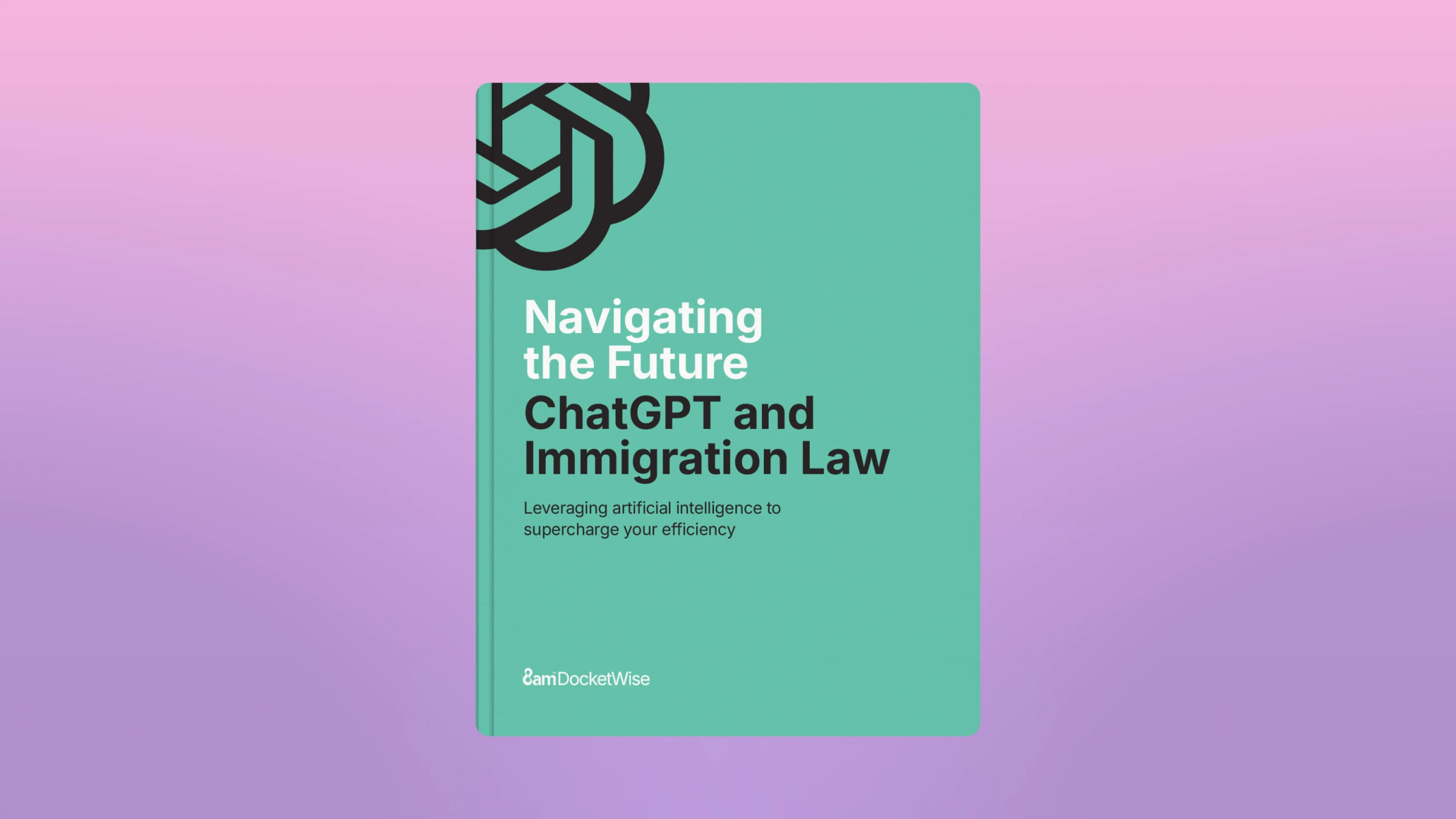Legal ethics is a central topic to the practice of immigration law, but unless you’re an expert on the topic, it can be hard to keep track of all the ways you can run afoul of ethics obligations. Our recent articles on building a successful family-based immigration law firm as well as digital marketing and social media have highlighted ways to grow an immigration practice, both for new attorneys just getting started with their own firms or experienced attorneys looking to expand further. Still, the one constant underlying every immigration law firm is the need to abide by ethics rules.
We recently recorded a webinar about ethics for immigration lawyers with two experienced immigration attorneys: David Cox and Eric Singer, and we wanted to dive into some of the topics covered on that webinar here to help demystify some important ethic rules.
Let’s dive in.
Where do ethics rules for immigration lawyers come from?
Before getting into the meat and potatoes of ethics, let’s first explore where ethics rules come from. Generally, as an attorney, you’re subject to the ethics rules of your state. But these rules are also modeled after recommended rules created by the American Bar Association. Let’s look briefly at both.
Your state bar: Each state has its own rules of professional conduct. Failure to abide by these rules could have serious consequences for your ability to practice law, so study them carefully. The American Immigration Lawyers Association has a great resource with every set of ethics rules by state in one place.
The American Bar Association: The ABA Model Rules are suggestions to the states, so their rules aren’t binding. Often, they vary slightly from the actual state ethics rules that are based on them, but it’s a good idea to get to know these rules because of the connection to the rules of your state.
We’ll go over six ABA Model rules (we recommend you get to know all of them) and some specific features within Docketwise that can save you time and create safeguards in relation to these rules. Let’s start with competence.
Competence within immigration law - having one or two experienced mentors is key.
It is essential to be well versed in immigration law if you’re going to practice it. Immigration law has its own set of statutes, court systems and opinions, and regulatory bodies, and regardless of your level of confidence with immigration law, especially in the beginning of your tenure as an attorney, it’s always advised to run your analysis and case preparation by one or two other experienced lawyers to check your understanding. This will help you ensure that you’re considering every possible solution and avoiding any errors, especially with more complex cases like asylum or deportation defense.
Competence also means knowing what you’re getting yourself into. A case that looks straightforward at the beginning may end up being more complicated than it seems. It’s also possible that a case that starts as one thing evolves into something else. For example a green card application for a family member can easily turn into an asylum case, so it’s important to know what to look out for.
In any case, you need to exercise caution and be confident with every step you take. Because pleading ignorance isn’t going to fly with your state bar, and errors can turn into ethical complaints or violations.
Scope of Representation within immigration law - clarify what you will and won’t be doing.
Establishing scope of your representation means clearly defining to your clients what services you will be providing. This is important because expectations are important, and you and your clients need to be on the same page. If your client thinks that you should be doing something that you don’t think you should be doing, that misalignment of expectations and service delivery can result in an ethical complaint.
Thus, it’s important to clearly spell out exactly what you will, and will not, be doing. Describing in detail what your representation involves is especially important if the case in question has a path to removal proceedings - let your client know whether you will be representing them if that happens. Representing your client for some things and not others is allowed under the model rules; however, the important thing to remember is that whatever you decide in terms of representing your client should be in writing.
Acting with diligence within immigration law - keep track of client deadlines
Following deadlines closely is very important in immigration law practice, and missing them can have consequences that range from minor to fatal. Being diligent and timely is relatively self-explanatory, but it’s worth mentioning two specific deadlines to be aware of.
Responses to agency requests, such as Requests for Evidence, as well as other applications such as BIA appeal submissions, have deadlines that are based on receipt of your package or application, not the postmark date when you sent it. For these types of matters, be sure to use a mailing service that can provide you with a tracking number so that you can monitor your package. It’s also important to note that USCIS has, throughout the COVID pandemic, allowed for some flexibility on deadlines, giving immigration attorneys and their clients more flexibility.
Another important “deadline” to be well aware of is when your client’s immigration status expires, or when they become eligible to file for a different status. Tracking these dates is important, and as an immigration lawyer, you should make sure that you have a system in place to deal with effectively tracking these deadlines and acting on them.
Client communication within immigration law - more is better.
Failure to communicate with clients is one of the most common ethical complaints against lawyers, so make sure you avoid misunderstandings by setting ground rules on how often you will communicate from the start of the case. Consider whether each client understands the actual steps of their immigration case and what they can potentially expect in order to avoid disappointments that may lead to a complaint.
Always make sure to promptly notify clients of developments in their case, especially if you receive something that requires them to act such as a request for evidence. And in general, try to return client calls personally and as soon as possible, and if you won’t be able to call your client back in a reasonable timeframe, delegate this task to a staff member. That being said, it’s also important to establish boundaries with your clients as far as call-back expectations so that you have some space and don’t get overwhelmed.
One of the tricky aspects of immigration law is that processing times can be lengthy and cases may go through extended periods where it may seem like there are no signs of progress. It’s a good idea to explain to your clients that, depending on the specifics of their case, they may not hear from you for a while because nothing is happening, and that that’s normal. Reassure your clients that agency personnel are working on their case behind the scenes and will notify the attorney and client when an action has been taken. Of course if a case does go beyond the typical processing time with no further action taken, then it’s time for you to start making case status inquiries with the agency.
This is also where it helps for your law firm to have a case management platform to help you monitor and take action on cases that are delayed. Docketwise, for example, allows users to set up workflows that break cases down into stages and let users know, by running a report, when certain stages are outside their normal processing times. Cases taking longer than estimated can be marked as “late,” and you can send a message to any clients with delayed cases. Depending on the version of Docketwise you have, it could be an email or text message.
Confidentiality within immigration law - take care of sensitive client information
As part of practicing immigration law, you’re naturally collecting a lot of personal, sensitive information about your clients and their families or companies. That includes information often used as identifiers, such as maiden names, dates of birth, and Social Security numbers. You have a duty to keep this information about your clients confidential. This is, of course, standard across all areas of law.
Diving a bit deeper into confidentiality, here are two nuanced tips to keep in mind that aren’t often talked about. First, be mindful of referrals. Specifically, when prospective clients come to your practice through a referral from someone they know, they may want confirmation that you did actually represent that person. Remember that representing someone in a legal matter, including an immigration matter, is considered a confidence in itself, so you’re ethically obligated to keep that information confidential unless your client has consented otherwise.
Email, text, chat conversations, and other forms of electronic client communications fall under the standard rules of confidentiality. So make sure that you keep all client interaction safe and secure. Remember that while email is a common form of communication, it’s actually not very safe, especially when sending sensitive information or documentation. The safest way to collect sensitive information or documentation is through a secure online portal, most often a case management system, that allows your clients direct access.
Conflicts of Interest within immigration law
This one is fairly simple, but it’s important to remember that you cannot represent someone whose interests are averse to the interests of your existing clients, past or present. Conflicts of interest can happen in family-based or employment-based immigration cases.
For example, if you also practice family law, you cannot represent one of the parties in a divorce if you previously represented them jointly in an imimgration matter.
As another example, in employment-based immigration, there could be a conflict of interest if you represent an employer and an applicant in an employment visa case, and the employee seeks your advice about their immigration options if they were to leave their current employment. If representing someone may have an adverse effect on an existing or past client, you need to refer the case to another lawyer.
Docketwise can help you manage your immigration law cases and avoid ethics violations.
The more effective you are at staying on top of your cases, communicating properly and securely with clients, keeping their information and data safe, and avoiding conflicts of interest, the more likely you are to avoid ethics violations, especially if you’re just starting out.
With Docketwise, you can take advantage of our streamlined client communication, secure data storage, best-in-class questionnaires and secure client portal for safe document uploading, case tracking capabilities, and more.
If you want to learn more about Docketwise, schedule a demo to talk to one of our team members, or sign up for our Immigration Briefings newsletter for daily and weekly immigration updates!
Transform Your Practice with ChatGPT
Discover how AI, particularly ChatGPT, can revolutionize your practice, from automating tasks to mastering effective prompting.
Download Now
About the author

James PittmanAttorney & Co-Founder8am Docketwise
James E. Pittman is a distinguished immigration attorney, co-founder of 8am DocketWise, and Director and Subject Matter Expert (SME) in immigration at 8am, a leading platform delivering purpose-built solutions for legal and accounting professionals. A former patent attorney, he later built a highly regarded U.S. immigration practice and is a sought-after CLE educator on immigration law and ethics. James is admitted in NY, NJ, before the USPTO, and hosts the DocketWise video podcast Immigration Uncovered.
